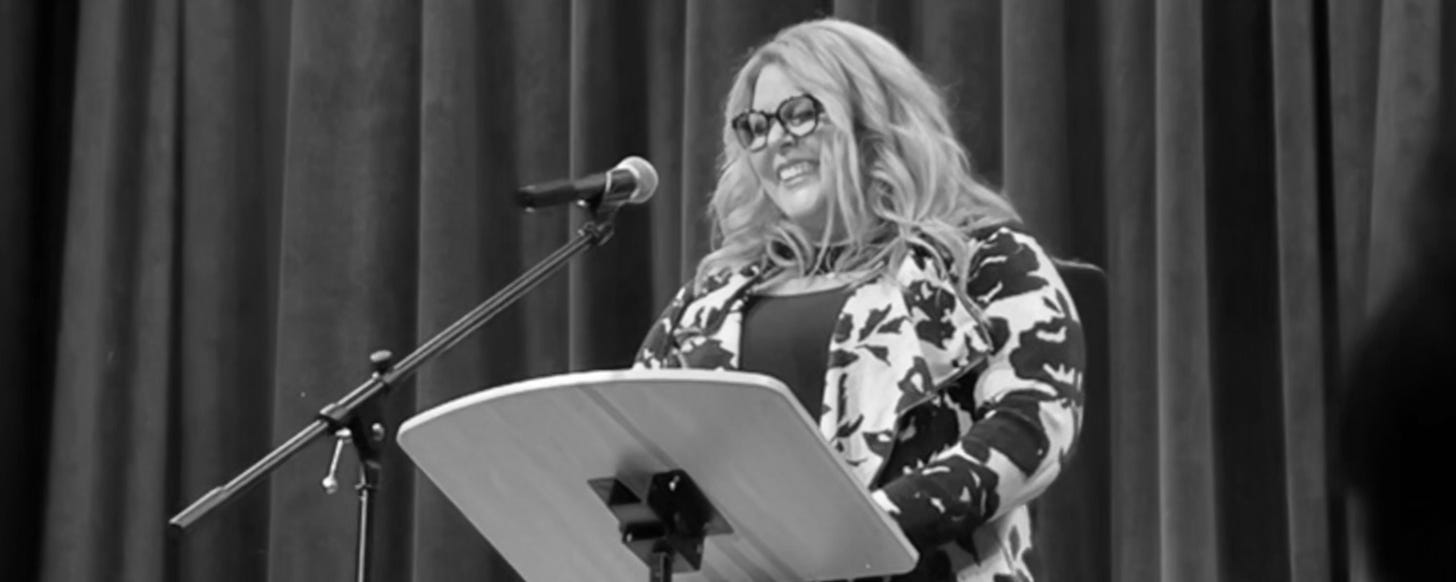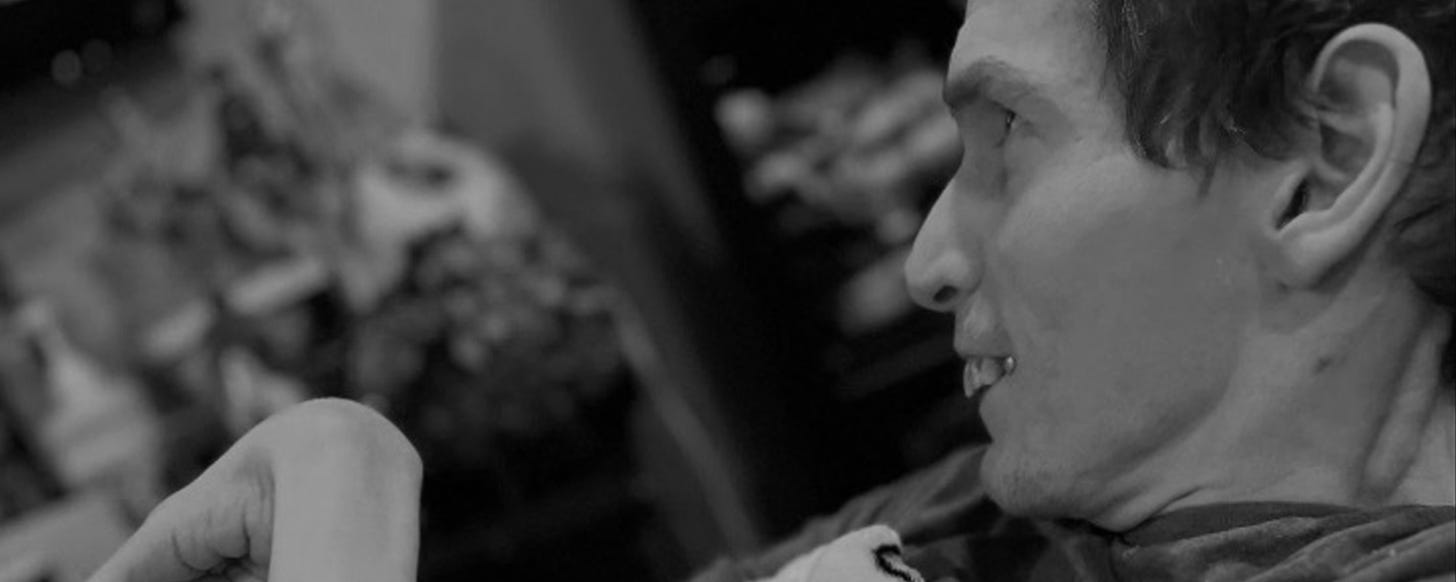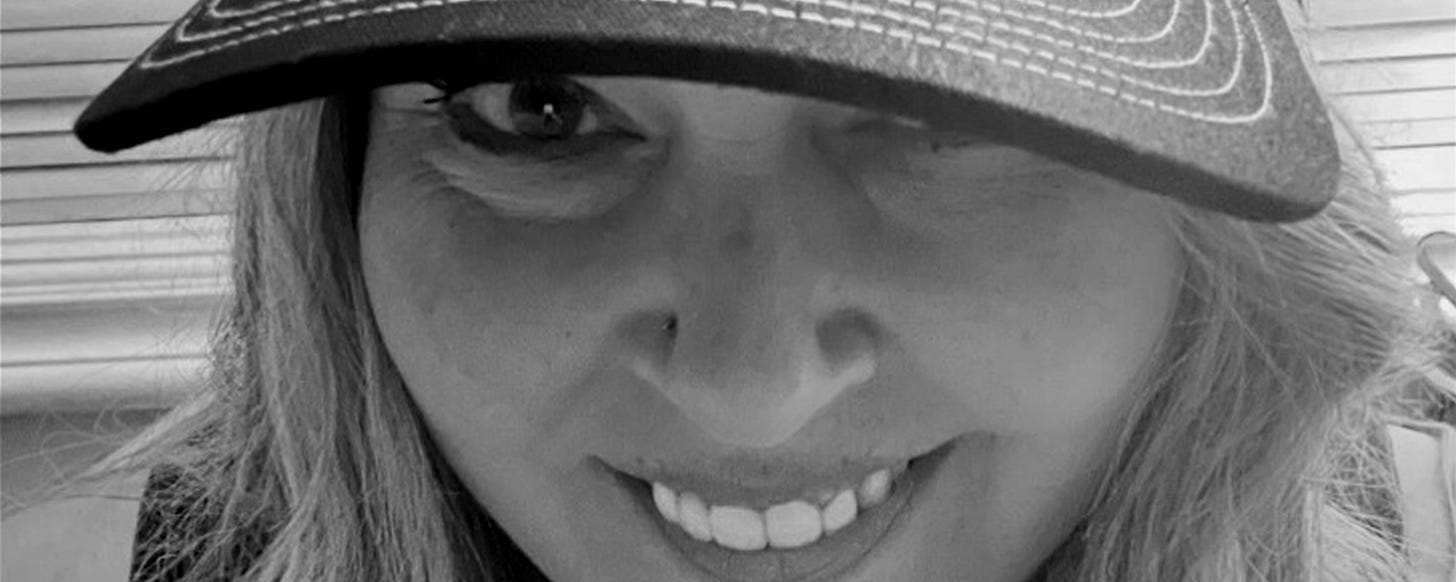Interview - Lori Johnson
Extended family member and master of helping others.
“It’s not your job to make me feel better about the situation you’re in.”
Lori is a close friend, and someone I’ve seen go through just about everything. Her wisdom and sense of humor is exactly what I hope to convey with this Substack, so it was obvious she should be the first interview subject. Note: Since we recorded this interview, her brother Shawn has been in and out of the hospital, again. She’s my hero.
Brandon: Hello, Lori Johnson.
Lori: Hi!
Brandon: When I thought of making this Substack, and I thought about helping other people through crisis, I kid you not, you were the very first person I thought of. So would you like to speak briefly to the experience you’ve had with helping - going through crazy stuff and helping other people go through crazy stuff?
Lori: Sure, and absolutely honored that you thought of me at all. Just a brief history for me - my brother has severe cerebral palsy with a lot of medical complications, he’s very medically fragile. And we lost our mother coming on 13 years, and I’ve always been a huge caregiver in Shawn's life and a huge part of his life and it was a no-brainer that I would take over once my parents were too old or sick or gone. So that’s what I did, and it’s been a rollercoaster to put it mildly. We had a lot of years where Shawn was stable, and a lot of peacefulness, and that ship has sailed. And now we’re moving into uncharted territory for him. He’s aging. There’s new problems coming up. There’s new medical issues. There’s new things that just don’t work for him. I feel like I’m on a sinking ship some days. And some days I feel like I’m treading water. And some days I feel like I’m an Olympic swimmer. It just depends on the hour of the day and how things are going.
Brandon: And you are a family friend. I’d say we’re as close to actually being family. Certainly my mom just kind of wormed her way into your family.
Lori: Thank God.
Brandon: So we’ve known each other for a long time, and you have definitely helped my family tremendously. Just really been there. And been, and this is something I want to get to on the Substack, but just been brutally honest. And it’s nice to have somebody that I don’t have to worry about necessarily how I explain something or what tone I use when talking with them. You’re pretty much down to talk about anything.
Lori: Well, yeah, because it’s not your job to make me feel better about the situation you’re in, if that makes sense. It’s my job to say “Hey, this friggin’ sucks!”
Brandon: Yes!
Lori: And I’m here. So tell me, you know, do you need to curse? Do you need me to bring you over food? Do you want me to sit with you and not say a word? Those are the things you want to hear. You don’t want to hear platitudes. You don’t want to hear kinda half-assed “Oh, I’m here for you” but you’re really not. Get in there. Tell them you’re there. You may not know the right thing to say, you may not know the right thing to do, but show up.
Brandon: Is that something you’ve learned from the way people have acted around you when you were going through difficult things? Or the opposite where you were dealing with somebody else and you saw what worked and what didn’t?
Lori: 100%, growing up my brother spent 37 brain surgeries at Children’s Hospital Los Angeles between the time he was born and the time he was 9. So you really got a feeling of the people that showed up, and typically it’s your family. They show up the most. But when you get those rare people that are dear friends, or sometimes it’s people you never expect would show up, it’s important that they’re aware of what you need. I never want to hear “Oh, you’re so brave.” I’m not the one going through it. Emotionally, yes, but physically - I’m just there supporting my brother and getting him through it.
Brandon: What I found in dealing with my son’s issues was actually a surprising amount of clarity of mind. In that things got so much more complicated, and there were so many things to remember and to manage, but at the same time there was no question where I needed to be and what I needed to be doing. And so it was interesting to kind of remove that from my day to day of just like “Oh, at least I don’t have to worry about what I’m going to do today.” I have a whole table full of plans. And that is kind of refreshing. You talk about you not feeling that you’re brave, and from my perspective that comes from being like “Where else would I be? This is absolutely what I should be doing.”
Lori: Exactly. I also really get annoyed if somebody says “Oh, I could never do what you’re doing.” You can when it’s your child. When it’s your sibling. When it’s your parent. You step up. It’s what you do.
Brandon: What do you wish other people knew? If there was something you could just kind of, by inception, plant into their brains? A lesson that you’ve learned from not only them dealing directly with you when the shit happens, but dealing with the shit itself. The whole situation.
Lori: So many things on so many different levels. I have things that I have learned about, I’m a professional hospital packer. I’m never in a car without my go-bag. Those are just essential things that I need to make it through because, as you know, you don’t know if you’re going to be there for 12 hours or 12 weeks. You go in blind, and hoping that you get to go home, but the reality is I’m usually there for 2, 3, 4 weeks at a time. And I don’t leave him because he can’t advocate for himself. And the doctors don’t understand, the nurses don’t understand how he speaks, and you make a new little home there. I always have my essentials, but I’m always missing things, so those are when the people who check in and say “what do you need?” I’ve gotten very brave at actually saying what I need. I wasn’t always that person. I would say “Oh, I’m fine.” And now I’m like “Ooh, you know what? I forgot my insulated water bottle, and, oh God, slippers would be amazing.” Or, you know, “Snacks?” Because sometimes when you’re up at 2, 3, 4 in the morning for 3 nights in a row you want salty, you want chocolate, you want sour, you know what I mean?
Brandon: Sure.
Lori: When people just go to Trader Joe’s and bring you two full bags, it’s amazing.
Brandon: Blankets are the number one thing.
Lori: Soft blankets.
Brandon: Every time we would go into the hospital, that first night, because Amanda would be like “I’m doing the first night, period, that’s just how it’s going to go,” and I was like “Ugh, we forgot to bring really cozy things, I will bring those tomorrow.” And then the next time, “Ugh, I forgot them again.” So, if you’re going to go visit someone in the hospital and they’ve only been there for a matter of hours, bring a pillow, bring a blanket.
Lori: Pillows. The hospital pillows are the worst. So, yeah, definitely bring a pillow.
Brandon: The hospital’s “everything” are basically not up to snuff when it comes to all the cozy stuff or the tasty stuff you can bring from home.
Lori: Correct.
Brandon: One thing I definitely want to get to is your creative side. Because you have managed to parse a lot of this, your history and a lot of this trauma, into telling stories. You are a published author, actually. I’ve seen you perform two different monologues about your many lessons that you’ve learned in life. How therapeutic has that been, and how was that whole experience been for you, getting all that out there?
Lori: It’s a lifeline. It absolutely is. In my go-bag, in my professional packing abilities, always there’s notebooks. One is for me to write down everything the doctor says because, as you know, you’re not dealing with one doctor, you’re dealing with a team, and each person on that team has a very different idea of what the best approach to take is. And they’re not always right. So you start furiously writing down what every doctor says, and at the end of the day you’re making the choices, with the medical team, to hopefully save your brother’s, or your child’s, life. So I always have that. But then I have my colors, and a different notebook or paper. And I doodle. And I write bad words on it. And I write little things that I want to remember that really strike my funny bone. I could write a whole thing on funny things that have happened in the hospital, and I probably should. Having a creative outlet is key for me to get through an experience like that. And plus, when you look back you can’t remember everything. You can’t remember day 1 from day 17. It blurs together. So if you’re making little notes, jotting things down, it really helps you go back and process it all later.
Brandon: What I think you need to publish is the coloring - not a coloring book - but the art book that you made for your father…
Lori: Laughs.
Brandon: …when he was going through a tough year. I think everybody in the world needs to see that thing. It is truly a fantastic achievement. Can you describe that very briefly?
Lori: Well, my dad has dealt with his own health issues since my mom was diagnosed with cancer, he’s been diagnosed three times with different cancers, and has gone through quite a bit. And he got really dark and down when he was 74. He decided this was just the last year of his life. And I have a very dark, creepy sense of humor so I thought it was funny that he wouldn’t stop talking about it. And the night that he turned 75 I put a little drawing, a little doodle, on his door with a little thing that said “Can believe you made another year,” or something like that. And that turned into a countdown for the next 365 days to get to the next birthday. And then when he did hit that next birthday we had a huge birthday party for him but we had it funeral themed. And it was a blast.
Brandon: And just to put it in people’s minds, these aren’t just silly doodles, these are pretty well accomplished, very biting, almost political satire in terms of their approach to what a hard-ass your dad is. And how curmudgeonly he can be, as much as we love him. He was my high school principal, just to put things in perspective for people. How this man was intimidating to everybody I went to high school with, and I was like “That’s Mr. Johnson. I’m not gonna - I can’t be scared of this guy.”
Lori: And you know the story he tells. The first day of school, you’re a 14-year-old kid. You came up, put your arm on his shoulder, patted him, and said “Hey, big guy!” So that’s always how he remembers you.” But if you do want to look back at my past, I do have an Instagram with all of the photos, because I needed to keep it in order to remember the nights that I’ve done them, to number them. It’s called trollingmydad365.
Brandon: I need the art from that. I need your headshot. I’m sure you have a beauty shot now, right? Because you’re appearing on stage.
Lori. No. Laughs
Brandon: You’re published. We gotta get you a premiere headshot. We gotta find a good picture of you to have for the website. So how do you, personally, just to end with a little bit of hope and a little bit of rest and relaxation for our readers, potentially dealing with stuff. How do you cope with craziness, just by yourself? When you don’t have anybody around to talk to. Shawn’s asleep. You get a moment. What do you do to cope?
Lori: I draw. Or I put down bits of a story that I want to tell later. Whether it’s a nurse that said something so obscene or obscure or hilarious that I want to remember it forever. I realize I can’t read in the hospital. I can’t focus like that. I have to do things where my hands are busy. My brain is busy. And I reach out to friends. Reaching out to friends is one of the biggest things.
Brandon: You sent me a text the last time we were in the hospital. You sent me a text and it was pretty late, actually. And you were in the hospital, too. We were hospital buddies. Across the large county of Los Angeles. We were in two completely different hospitals. And you just messaged me like “This sucks.” And I’m like “Yeah, it sucks. What do you do?” Sharing how we deal with all of this differently. Hopefully somebody out there will relate, or maybe learn a lesson or two. I know I have learned a lot from you, Lori Johnson. Thank you for chatting with me.
Lori: Thank you.
Brandon: We’re recording this on a Saturday. Do you get parts of Saturday off? Is this a relaxing moment that you were able to put aside? This is, like, the fourth time we tried to schedule this?
Lori: Right? Laughs
Brandon: And when you bumped it the third time, I was like “I picked the perfect subject for this Substack.” I’m happy to get you. To chat with you.
Lori: It depends on the day and the hour. And sometimes my alone time comes at 4 am when Shawn’s asleep, finally, because he’s been up all night. I get to run out and get a pedicure once in a while. Self care is huge. And so I try to make sure that, even if it’s just slapping on eye puffy - what are those things - the little things you wear under your eyes for 20 minutes. Even if I’m not going out of the house it makes me feel like “Oh, I’m doing something for me.” So all those things add up and make you feel like a whole person.
Brandon: Well, I want to get that glamour headshot so people can see how fabulous you look.
Lori: Oh goodness.
Brandon: Even putting all this stuff together. I love you, Lori. Thank you so much for chatting with us.
Lori: I love you, too.
Brandon: Any parting words you want to have for people potentially dealing with something horrible?
Lori: Just show up for people. Because we’re all going to go through something at some point. And you’re going to want people around you. That’s key, I think, to survival.
An audio recording of this interview is available below (for paid subscribers).
Keep reading with a 7-day free trial
Subscribe to The Friend's Guide to Horrible Things to keep reading this post and get 7 days of free access to the full post archives.








